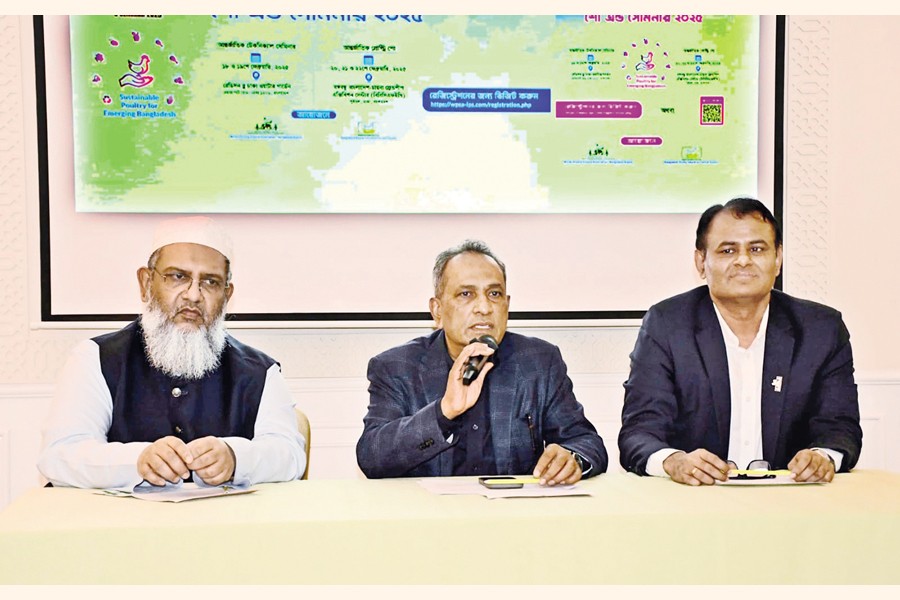
Published :
Updated :

The 13th three-day International Poultry Show is set to begin at the Bangladesh-China Friendship Exhibition Center in Purbachal on February 20, which organisers believe, will help double the production of eggs, milk, and poultry.
On the other hand, the two-day 13th International Poultry Seminar is scheduled to kick off at Radisson Blu Dhaka Water Garden on February 18.
Moshiur Rahman, president of the World's Poultry Science Association-Bangladesh Branch (WPSA-BB), made the announcement at a press conference held in a city hotel recently.
With the population rising gradually and arable land decreasing, the demand for eggs, milk and meat is projected to be more than double by 2050. To meet the growing nutritional needs for about 220 million people, it is essential to increase food production by integrating modern knowledge and technology into the poultry sector.
Speaking at the press conference, Mr Rahman said Bangladesh produces about 45 million eggs every day, nearly 20 million day-old chicks weekly and around 7.5 million to 8 million tonnes of feed annually -- an achievement that was unimaginable three decades ago.
The government aims to increase annual per capita egg availability to 208, daily milk availability to 300 millilitre and daily meat availability to 160 grams by 2041.
Achieving these goals would require doubling the current production levels, which is impossible without the use of advanced knowledge and technology in poultry science, he said, adding that these events aim to equip Bangladesh's poultry farmers with the skills they need to face the growing challenges.
Underscoring the significance of the show, he said that the journey of modern poultry farming in Bangladesh began with WPSA-BB's International Poultry Show. He sought cooperation from the media for the success of the three-day show and two-day seminar.
Dr Biplob Kumar Pramanik, general secretary of WPSA-BB, stressed the importance of safe and hygienic food to address the country's nutritional needs. Since most people in Bangladesh are middle-income earners, WPSA-BB is committed to ensuring that eggs and poultry meat are affordable for ordinary people, he said.
Shamsul Arefin Khaled, president of the Bangladesh Poultry Industries Central Council (BPICC), presented a paper titled 'Sustainable Development of the Poultry Industry in Bangladesh' to illustrate the current state of the industry.
Citing international research, he said that the poultry industry has seen little progress from 2021 to 2024, with periods of production decline. Though Bangladesh produces the cheapest animal protein, it still faces the global challenges of food inflation, he said. He stated that the price of eggs in the United States soared by 150 per cent in a year and in India eggs are now priced over Tk 10 each.
Ensuring food and nutritional security has become increasingly difficult, Mr Khaled said, adding that the poultry sector in Bangladesh has faced severe volatility in recent years, with frequent fluctuations of prices in eggs, chickens and chicks. There must be a rise in production and a focus on environmental sustainability to stabilise the sector, he said.
Journalists at the conference acknowledged the importance of addressing the challenges in the poultry industry and stressed the need for smooth exchange of information between the media and the stakeholders. They pointed out that a lack of data creates confusion about the situation, particularly when affordable eggs and broiler chicken are vital for lower and middle-income groups.
They called for urgent collaboration between the government and the private sector to develop actionable plans with some underscoring the need for in-depth reporting to shed light on the industry's challenges. They further requested that trust between the stakeholders and the media should be built to ensure free flow of information.
Dr Bishwajit Roy, member secretary of the Media Sub-Committee for the 13th International Poultry Show and Seminar, moderated the conference.


 For all latest news, follow The Financial Express Google News channel.
For all latest news, follow The Financial Express Google News channel.